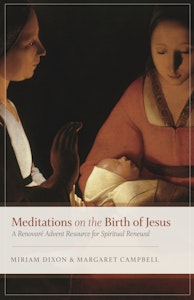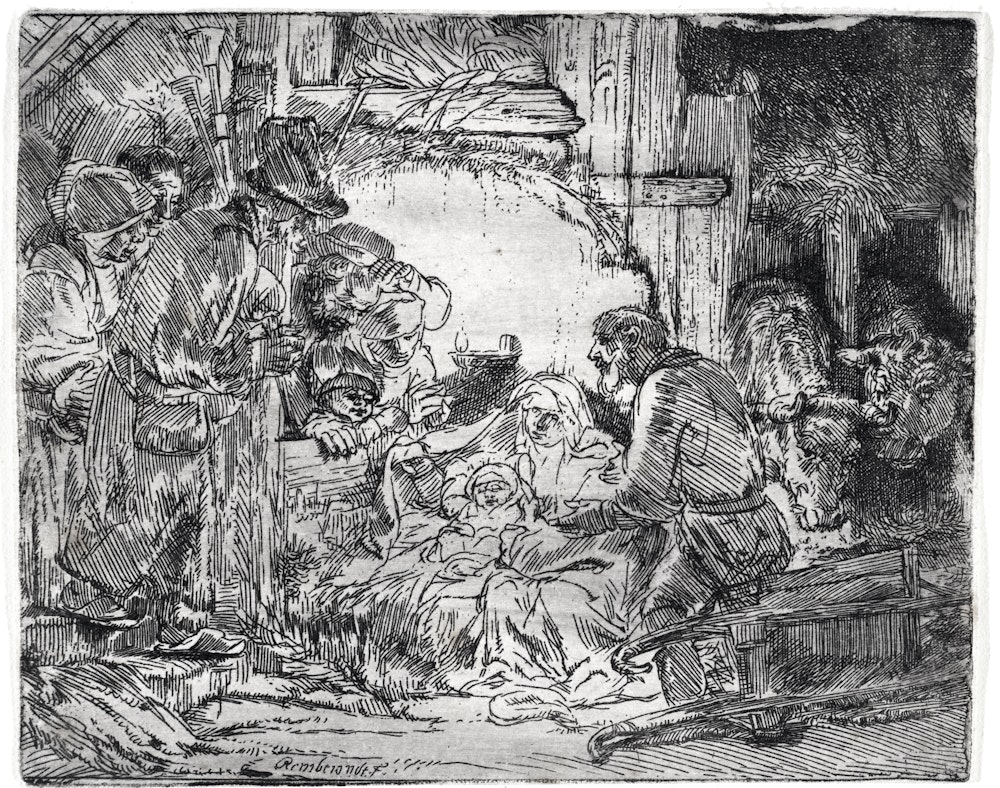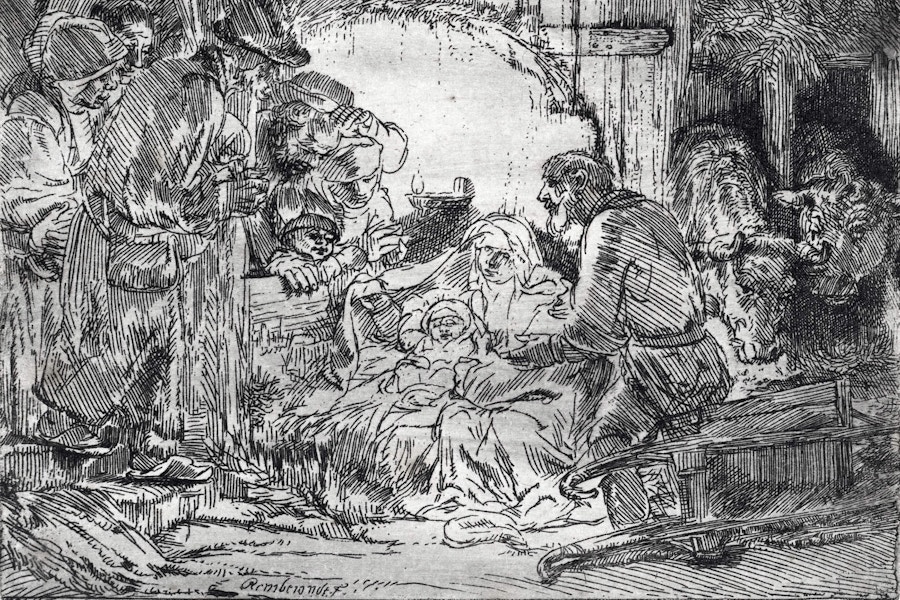 Excerpt from Meditations on the Birth of Jesus
Excerpt from Meditations on the Birth of Jesus
I am bringing you good news of great joy for all the people. —Luke 2:10
Passage for Lectio Divina: Luke 2:1 – 20.
Joseph and Mary are the subject of local gossip when the news cycle suddenly shifts. No longer is Mary’s pregnancy the talk of the town; now everyone is complaining about the order issued by Emperor Augustus requiring that every Jew twelve years of age and older travel to their ancestral city to be registered. Not registering amounts to criminal tax evasion.
The timing couldn’t be worse. Mary is in her ninth month; any day the baby might arrive. Nevertheless, they pack up and head to Bethlehem, some ninety miles to the south. Mary’s condition means frequent stops, making the long journey longer. They finally arrive only to find all available lodging is occupied.
Imagine being in this position. Joseph must find a place, and fast. A compassionate innkeeper offers space in a cave that serves as a stable. The space is dark and dank, crowded with animals, but it will have to do. Joseph makes a bed of fresh straw for Mary, who now is in full labor.
Move closer to where they are crouched near the opening to the cave. What smells are they trying to avoid? What sounds do you hear? This is no place for God’s Son to be born. The world goes on outside, oblivious to the new creation which has begun.
The newborn Jesus draws his first breath of earth’s air, and heaving cries fill the small cave. Exhausted, Mary and Joseph carefully wrap the newborn in strips of cloth and lay him in a feeding trough heaped with fresh hay. He quiets. Mary and Joseph huddle together, gazing into the infant face of God.
Luke does not linger here. He draws our attention to a steep valley nearby where a group of shepherds are settling their sheep for the night. They are in quiet conversation when an announcement arrives of such importance that it will immortalize these forgettable men. It is the news of the century, of the millennium, of all millennia. If Augustus made a list of those who should receive such news, these men would be last. That they are first tells us something about the kind of kingdom now breaking in upon humanity. A bright light switches on like a spotlight, illuminating them, and an imposing angel appears. Terrified, they shrink back.
The angel speaks. What does his voice sound like? How does he appear? Notice the stunned expressions on the faces of the shepherds, the movement of their bodies.
“Do not be afraid; for see — I am bringing you good news of great joy for all the people: to you is born this day in the city of David a Savior, who is the Messiah, the Lord. This will be a sign for you: you will find a child wrapped in bands of cloth and lying in a manger” (vv. 10 – 12).
The divine messenger is joined suddenly by an immense choir of angels. Hundreds with their mouths wide open, songs spilling out. “Never heard nothing like it before,” they would later say. “Never seen nothing like it! Never will again. It was spectacular. Jaw-dropping.”
Then, as suddenly as the choir appeared, the angels vanish. Just like that.
In the stunned silence, one of the shepherds asks if they should go see this wonderful thing that the Lord had told them about. So they scramble up the hill and canvas the town, searching for a stable and a newborn baby.
Their search is rewarded.
Imagine the scene when the motley shepherds smelling of wood fire and sheep burst in. Picture Joseph and Mary’s startled expressions. The shepherds hurry to the manger and point with wonder and excitement at the baby. He is exactly as the angel described. They were the first to hear the news. Now they are among the first to see the long-awaited Messiah.
Disoriented and tired, Joseph sits up. He leans forward protectively. Mary is quiet, watching, listening as the story tumbles out: something about an angel announcing the birth of the Messiah — and a cosmic choir. “The angel told us where to find him,” the shepherds explain.
After a few minutes they rush out again, spilling into the crowded street outside, telling everyone they meet what the angel had said.
“All who heard it were amazed at what the shepherds told them. But Mary treasured all these words and pondered them in her heart” (vv. 18 – 19).
Did the incongruity of the setting register with the shepherds? Did they stop to wonder why the Messiah was born in a stable attended by animals? Someday we can ask them. For now, we notice.
The arrival of God in human history was humble and awkward and messy. Everything appeared to align against God’s glorious plan being fulfilled. Mary and Joseph were forced at every turn to adjust to unfolding events. Yet through their willing cooperation, God’s will was accomplished and hope was born.
This is the way that God has always chosen to accomplish his divine purposes. God invites ordinary persons in ordinary circumstances to merge their smaller stories with God’s Epic Adventure.
Notice that Mary paid close attention to every detail. She was watching, learning. The setting is not what she had imagined, yet the embodiment of God’s promise and love was asleep in her arms. He stirs in his sleep and turns his face toward the light. Mary smiles. All is well.
Heavenly Father, Lord Jesus Christ, indwelling Holy Spirit — thank you for your gift of eternal life. My Christmas gift to you is my obedience, my life, my love. Happy Birthday, Jesus!
Visio Divina
Spend a period of time in personal reflection on the artwork below. You may find these steps of Visio Divina helpful:
- Request. Ask God to guide your thoughts and impressions through the Holy Spirit.
- Gaze. Take in the painting. Notice its structure, the placement of the people and objects in the artwork, the shape and form, the use of light and shadow, the empty spaces. What catches your attention?
- Reflect on what you see. Pay attention to your impressions, thoughts, and feelings. How does the image deepen your understanding of the text?
- Respond and Receive. Carry the details of the image with you through the coming week in the way you might carry a word from Lectio Divina with you. You may find that God is inviting you to pray as the appropriate response to what he has shown you. What is God’s invitation? Receive what God has shown you and rest in a posture of obedience and devotion.

In seventeenth-century Holland, Rembrandt van Rijn’s prints, like this one, were more highly regarded than his precisely executed paintings. Printed from a copper plate etching, The Adoration of the Shepherds: With the Lamp shows his ability to create light and shade through fine lines and thick lines. The spontaneous lively style welcomes the observer into this extraordinary scene. Rembrandt’s unusual decision to place Joseph in the foreground allows us to see his position in the Holy Family. Holding the sleeping infant, Mary’s quiet presence bridges the space between Joseph and the shepherds. Joseph’s open arms are extended toward the shepherds as they press in to see the Christ child. The semicircular glow from the light of the lamp draws the figures together. In this simple line etching Rembrandt creates the joy and hope of the first Christmas.
Going Deeper
- Look at Rembrandt’s portrayal of the first Christmas. How does the picture make you feel? What draws your attention? Ponder the message the Lord would have you receive through your meditation.
- Like the shepherds, have you received a message of hope from the Lord, either directly or through the witness of others? What makes it easy for you to receive this as being God’s word to you? What makes it difficult?
- The first Christmas was messy. In your current circumstances, what is catching you by surprise? Say a prayer for help to recognize God’s presence in the chaos of interruptions and unfolding events.
Excerpted from the Renovaré resource Meditations on the Birth of Jesus, copyright 2019 Miriam Dixon and Margaret Campbell. Download it free or purchase physical copies.
Text First Published December 2019 · Last Featured on Renovare.org December 2023



